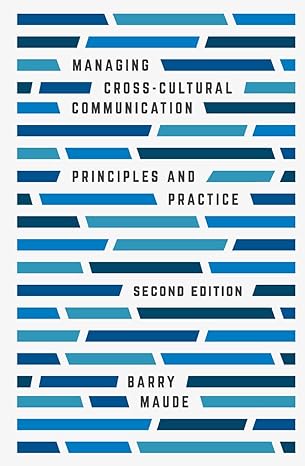Job candidates who are well qualified to do the job and who have appropriate experience may turn
Question:
Job candidates who are well qualified to do the job and who have appropriate experience may turn it down if they perceive the selection process to be inefficient or unfair.
That is why interviewers and the cross-cultural selection process must not only be fair and unbiased but also be perceived to be so.
Deepak is a 38-year-old Indian graduate engineer with more than ten years’ industrial experience, acquired while working as a maintenance engineer in manufacturing companies in India. Four months ago he moved to Toronto, where his older brother has been living for the past three years. Now Deepak is looking for a job in Canada.
His brother helps him to write an application letter which he sends, together with his resume, to several manufacturing companies in Toronto. Only one company responds positively to Deepak’s application. This is Optima Security Systems, which makes a wide range of products for domestic and export markets.
HR personnel at Optima are not at first impressed by Deepak’s application.
Deepak’s letter is wordy and unfocused, and far too much information is presented in the resume. This initial reaction by HR confirms research by Vida (1999) which found that people from high-context cultures like India tend to write more than is necessary in written communications to compensate for the lack of nonverbal communication opportunities in a written document.
Deepak’s wordy resume fails to impress the HR department. There is also the question of relevance since, at first glance, Deepak’s job experience appears to be inappropriate.
His resume, which is presented in reverse chronological order, indicates that his last job in India was as a security guard. However, when Deepak’s last job is ignored, his work experiences in three separate roles prior to the last one do appear to be relevant. Accordingly, after some hesitation, the HR department decides to process the application.
Optima’s recruitment process The recruitment process at Optima has several steps. The first step involves HR personnel holding one or more phone conversations with the candidate. The main outcome of the two separate phone conversations held with Deepak is that Deepak’s English language proficiency is confirmed.
The next step is to invite Deepak to visit the factory for informal discussions with HR staff. These discussions bring out the relevance of Deepak’s job experience, but they also reveal Deepak’s lack of cultural awareness. In high power-distance cultures such as India, managers tend to behave in an autocratic, directive way with lower-status coworkers, and Deepak does not realize that such an approach would not be appropriate in a Canadian workplace. Clearly, he will need to change his ‘natural’ management style if he is offered the post of maintenance manager at Optima.
‘Speaking the same language does not mean sharing the same culture,’ the HR manager tells Deepak as the discussions end.
The formal interview Deepak is now invited to attend a formal interview with the production manager, Bill Benson, a native English-speaking Canadian. Bill decides to concentrate on building a relationship with Deepak in the first 10 minutes of the interview and not to form any opinion of the candidate, pro or con, during this time. Bill realizes that he will need to be tolerant of any cultural differences that emerge in the interview.
Consequently, when the interview begins instead of starting to assess the candidate straight away Bill begins with an icebreaker. This consists of small talk about the weather, sport, places in Canada that Deepak has visited or plans to visit, and so on.
When rapport has been developed and the candidate seems to be reasonably relaxed, Bill begins to make an assessment of Deepak’s competencies and his suitability for the maintenance manager post.
The low-key start to the interview encourages Deepak to talk freely about his varied work experiences to date. These seem to have equipped him with a set of strong transferable skills which, Bill believes, the company will be able to make use of more or less immediately.
The candidate’s knowledge of the company’s products and services is poor but could be boosted by frequent coaching inputs from Bill himself in the first six months.
Cultural differences Bill mentions several cultural similarities and differences between himself and Deepak that he has already noticed. These include differences of diet. But interviewer and interviewee have a common interest in most kinds of sport. This leads into a brief discussion about differences in attitudes, perceptions and behaviours between Indians and Canadians generally. The interview concludes with a discussion about practical steps that Deepak could take to make his ‘natural’ management style more acceptable to Canadian co-workers.
Bill says that he thinks it will be important for Deepak to demonstrate cultural awareness in the job since in Canada employees want to be listened to and to be consulted by their bosses. Bill says that it is equally important for himself – as Deepak’s future boss – to demonstrate cultural awareness. That is why he has already booked himself on to a two-day, cross-cultural communication course at a local college.
At the end of the interview, Bill offers Deepak the job of maintenance manager at Optima with a starting salary 10 per cent higher than that mentioned at the start of the interview.
Step by Step Answer:

Managing Cross Cultural Communication Principles And Practice
ISBN: 978-1137507464
2nd Edition
Authors: Barry Maude





